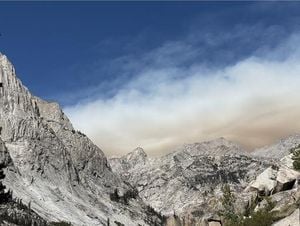The world is buzzing with reports of unidentified aerial phenomena (UAP), often referred to as UFOs, and the situation has escalated beyond just interesting headlines. Over the past month, regions such as New York, New Jersey, and Pennsylvania have become hotspots for mysterious sightings, leading to widespread concern and speculation.
Former President Donald Trump, once again receiving attention, addressed the issue on his social media platform, Truth. He proclaimed, “Misteriosi droni sono avvistati in tutto il Paese. Non penso che questo possa accadere senza che il governo ne sia a conoscenza. Chiarite con il pubblico. Ora. Altrimenti abbatteteli.” (Mysterious drones are spotted all over the country. I don’t think this can happen without the government being aware. Clarify with the public. Now. Otherwise, shoot them down.) This call for action captures the growing anxiety among the public and has ignited discussions about government transparency and safety as these sightings proliferate.
The situation is taking on global dimensions, with reports of similar phenomena occurring not just in the United States, but also across the globe—in countries including Russia, Germany, Japan, the United Kingdom, India, and Brazil. Eyewitness accounts describe intense luminous glows and objects flying together, prompting investigations from national intelligence services.
Secretary of Homeland Security Alejandro Majorkas attempted to alleviate public fears during recent press briefings, stating, “Non siamo a conoscenza di alcuna minaccia o attività nefasta,” (We are not aware of any threats or sinister activities). His reassurances come amid increasing reports of these airborne sightings, which are casting shadows of doubt and paranoia over affected communities.
Pennsylvania Governor Josh Shapiro is taking the matter seriously, announcing helicopter missions to directly investigate the claims made by residents about unusual lights and formations seen against the night sky. Descriptions characterize these objects as small aircraft, around four to five meters long, illuminated with white and red lights, sparking curiosity and concern among those who witness their appearances.
Researchers and activists within the UFO community are responding with equal urgency. Roberto Pinotti, president of the National UFO Center, alongside Vladimiro Bibolotti from the International Federation of Advanced Studies, issued statements about the geopolitical significance of UAP appearances. They noted, “Lo scenario che investe la tematica Ufo sta coinvolgendo la geopolitica, come fenomeno mondiale che non conosce confini,” (The scenario concerning the UFO issue is engaging geopolitics, as a global phenomenon without borders). This global concern has led to formal discussions within the European Parliament, pushing for collaborative investigations and policy-making to address UAP sightings systematically.
Academia is becoming increasingly interested as well, with initiatives like Harvard's Galileo Project engaging scholars to study UAP rigorously. Research organizations are pooling knowledge, engaging ex-government officials and leading scientists, showing how high the stakes are becoming.
On social media, the conversation escalates, taking on bizarre undertones as conspiracy theories surge, positing both possible alien invasions and reckless military tests gone wrong. Some even suggest these sightings could serve as elaborate marketing schemes for upcoming films or shows, echoing the panic invoked by Orson Welles’ infamous “War of the Worlds” radio broadcast in 1938.
Back to the observed phenomena, there’s speculation about military involvement: Are these sightings the result of experimental drones, perhaps foreign surveillance mechanisms, or something far more complex? Reports of recently sighted objects resulting from military drills suggest not everything seen is of extraterrestrial nature, yet explanations remain elusive.
We stand today at the precipice of an increasingly complicated relationship between technology, public concern, and the growing phenomenon of UAP. Though many sightings can be attributed to explainable causes, as officials assert, the sheer volume and consistency of reports are driving discussions to levels previously thought impossible. Citizens now demand clarity over these mysterious aerial lights popululating their skies.
Cautious optimism lingers amid the chaos, as calls for transparency become louder, indicating the necessity of proactive measures to engage and inform the public about such high-risk phenomena. The decision by European lawmakers to act, along with initiatives from prestigious universities, emphasizes the importance of bridging the gap between public perception and governmental action.
The debate over unidentified aerial phenomena continues to grow, merging scientific inquiry with public discourse. Will we find satisfactory answers soon, or will these mysteries persist as compelling tales of our time?



